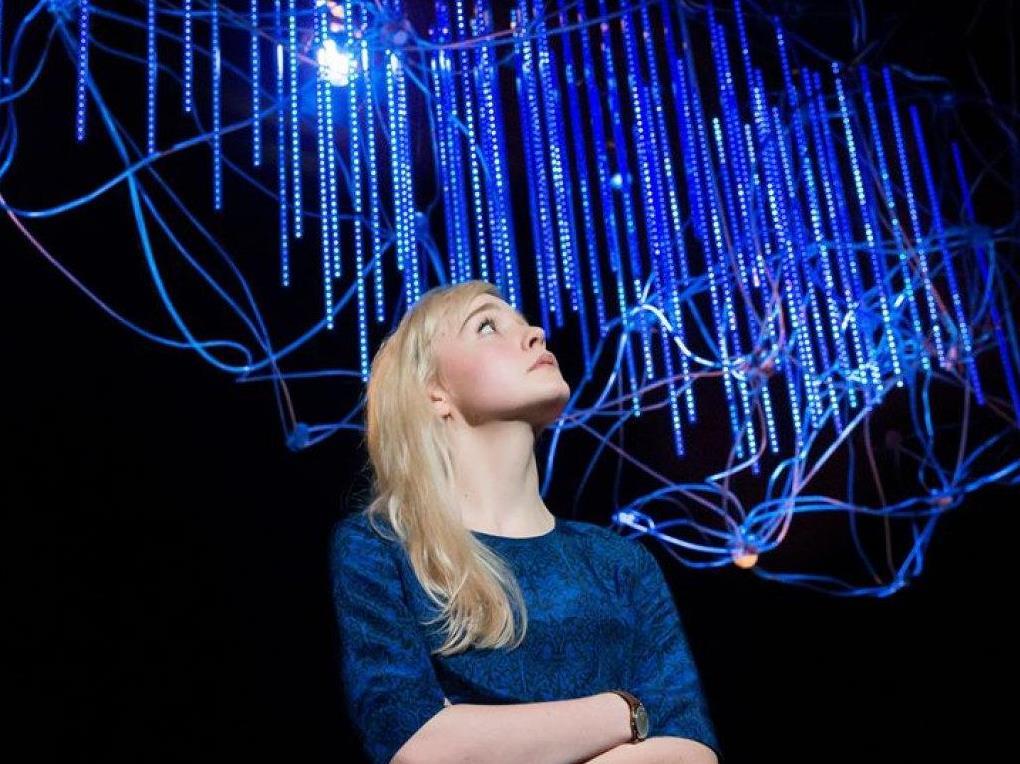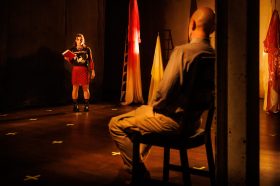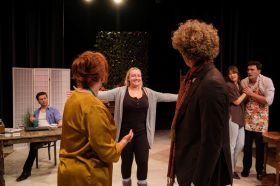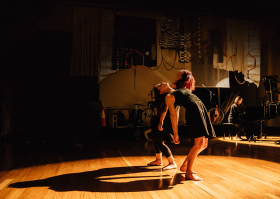Image: ntlive.nationaltheatre.org.uk
Revered playwright and screenwriter Tom Stoppard is arguably best known for his classic play Rozencrantz and Guildenstern are Dead and the screenplay for Shakespeare in Love. He is renowned for his witty dialogue, experimentation with theatrical form, and willingness to tackle complex philosophical ideas. The Hard Problem, his most recent stage play, is realistic in style, but typically Stoppardian in its trademark sparkling banter and dizzying proliferation of theoretical concepts.
Central character Hilary (Olivia Vinall) is a psychology student obsessed with the idea of human virtue: is it the result of nature or nurture? Is altruism merely egoism in disguise? And if pure goodness does exist, does this suggest the existence of God? This preoccupation throws her into conflict with her tutor Spike (Damien Molony), and with her colleagues at the Krohl Institute, a neurobiology research centre where she ends up working. Unbeknownst to them, she has a very personal reason for hoping that life is more than a series of random coincidences, and that someone is hearing her prayers.
Ultimately, Stoppard appears more interested in his themes than in his characters. The subplots concerning Hilary’s secret and the other characters’ romantic lives, feel tacked- on and shallow. These characters – almost all scientists – endlessly spout information about biology, natural history, physics, economics, religion and philosophy – not just at work, but at the breakfast table, during dinner parties, and in bed before and after sex. This last element is problematic, as Hilary’s career success seems more linked to her sex appeal than to her abilities.
After bedding her tutor, underqualified Hilary bluffs her way into a plum job at the prestigious Krohl Institute, acting on a tip from a friend’s girlfriend that her interviewer Leo (Jonathan Coy) is obsessed with ‘the hard problem’ of human consciousness. She later describes getting the job as ‘a miracle’. When Leo later turns out to be in love with her, it throws this appointment into an even more dubious light. At a conference, Leo makes an unwelcome pass at her. In a subsequent scene during an argument at work, director Nicholas Hytner has Coy trap her between the desk and his body while he yells in her face. Incredibly, none of this seems to permanently affect their working relationship, and when she leaves the Institute they part as good friends.
In the meantime, she is shown preparing an experiment that closely resembles the notorious real-life Milgram study, which caused lasting psychological damage to everyone involved and has since been largely invalidated. She also blithely signs off on the joint publication of a paper with her colleague Bo, unaware that Bo has falsified the results (much is made of Hilary’s weakness in maths) to make them ‘sexier’ and advance the status of their department.
Despite all this, Hilary is apparently not regarded as incompetent or foolish. Indeed, Stoppard invites us to regard her as the play’s moral centre as she takes the blame for Bo’s dishonesty, saving her colleague’s career and sabotaging her own in the process. When at the play’s conclusion she retreats to university, to study philosophy, what are we to make of it? It’s almost as if she’s considered too good for this world of lies and compromise, but her behaviour up to this point has been more passive than saintly.
Her credibility as a character is further undermined by Vinall’s overblown performance. Her gestures, expressions and even voice projection are exaggerated almost to the point of melodrama. Perhaps this is exacerbated by the fact that with a filmed play, the camera gets closer than the audience ever would; however the rest of the cast is relatively understated. Damien Molony is charming as puckish Spike, Rosie Hilal is endearing as slightly daffy Pilates teacher Julia, and Lucy Robinson is amusing, if somewhat stereotypically butch, as her girlfriend Ursula. Parth Thakerar is deliciously smarmy as status-obsessed Amal, who uses maths to predict the stock market and is unapologetically indifferent to arguments about truth and beauty.
The Hard Problem wants to be a satire on the corruption of science by big business – I think. It presents such a mishmash of ideas that discerning a point to it all is actually quite difficult.
Rating: 2.5 out of 5 stars
The Hard Problem
By Tom Stoppard
Director: Nicholas Hynter
National Theatre Live- distributed by Sharmill Films
Cast: Damien Molony, Olivia Vinall, Parth Thakerar, Jonathan Coy, Rosie Hilal, Lucy Robinson, Anthony Calf, Daisy Jacob, Vera Chok, Kristin Atherton
Screening nationally from 23 May 2015 in selected cinemas





